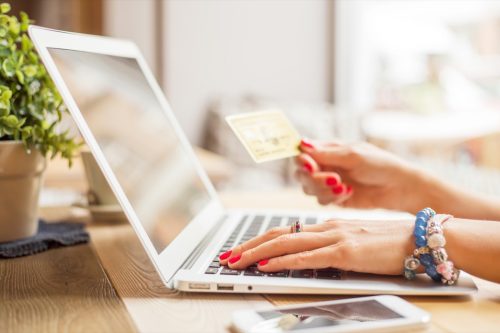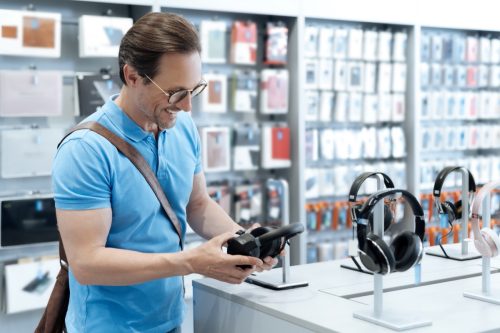Always Use Your Credit Card for These 5 Purchases, According to Financial Experts
Swiping that plastic for certain items could seriously pay off.
Your credit card can come in handy for a variety of situations, like building credit and buying big-ticket items that you need to pay off over time. What you may not know, though, is that using your credit card can have many other major advantages, from fraud protection to cash-back rewards. Knowing when to use your credit card—over, say, cash or debit—can help you to make better financial decisions that pay off in the long run.
"Using a credit card can help establish or improve your credit score over time, as long as you make timely payments," says John Cabell, managing director of payments intelligence at J.D. Power.
According to NerdWallet credit cards expert Sara Rathner, credit cards also often come with certain consumer protections that debit cards don't have—like warranty and price-match protection.
"If you notice a fraudulent charge on your credit card, you're not out any money," Rathner explains. "You can solve the problem with a quick phone call to your credit card company. With debit cards, the longer it takes you to notice and report fraud, the more liable you are to cover a portion of the stolen funds."
With all that in mind, here are five types of purchases you'll definitely want to bust out your credit card for.
READ THIS NEXT: Never Use Your Credit Card for These 6 Purchases, According to Financial Experts.
1
Recurring subscriptions

Courtney Alev, consumer financial advocate at Credit Karma, highly recommends using your credit card for recurring charges—like a streaming service, grocery delivery subscription, or gym membership.
"An affordable recurring charge that you're able to pay off on time and in full each month helps you establish a good credit history and increase your credit over time, even if it's a small purchase," Alev explains. "Just make sure to set up autopay so you can 'set it and forget it' while knowing your bill will always be paid on time."
Jennifer Doss, credit card analyst and senior managing editor of CardRatings.com, suggests paying your monthly cell phone bill with your credit card. Many credit card companies offer cell phone insurance—meaning that if your phone is damaged or stolen, some or all of the cost of fixing or replacing it may be covered.
2
Online purchases

When choosing between your debit or credit card to buy something online, Alev advises opting for the latter. If something goes wrong with your purchase and the merchant won't resolve it, Rathner says it's much easier to dispute the charge when you use a credit card.
"Many credit card companies will work with you to get a refund if you never receive an item you paid for," adds Alev.
This is especially important when buying more costly items—as Rathner points out, you'll have recourse and peace of mind if the product gets lost or stolen on its way to you.
READ THIS NEXT: Always Use Cash for These 5 Purchases, Financial Experts Say.
3
Travel-related expenses

Whether you're planning a romantic weekend getaway, a quick business trip, or a lengthy family vacation, you'll definitely want to whip out that plastic for flights and hotel bookings.
"Many credit cards offer bonus rewards on travel purchases," says Doss. "And by paying for eligible travel purchases with your credit card, you may be protected if something goes wrong during, or leading up to, your trip."
Dean Kaplan, debt collection expert and president of The Kaplan Group, always uses a credit card for travel-related expenses.
"This way, I get ancillary benefits such as emergency medical coverage, lost luggage reimbursement, and even trip cancellation/delay insurance," he explains. "Some cards even waive the foreign currency conversion charge when you are out of the country, which can save you 5 to 10 percent versus converting cash or using an ATM to get cash."
For more financial advice delivered straight to your inbox, sign up for our daily newsletter.
4
Electronics

In the market for a new flat-screen TV, tablet, or smart home hub? Levon L. Galstyan, a consumer finance expert and CPA with Oak View Law Group, strongly suggests using your credit card for purchases like these.
"Credit cards enable you to accumulate points through high-value electronics purchases—and also provide added benefits such as purchase protection and extended warranty coverage," he tells Best Life. "So, if you buy the latest smartphone with a two-year warranty, you might be able to gain an extra year of coverage with the correct credit card. Some credit cards may also provide theft and damage protection for a limited time after purchase."
5
Any products from unfamiliar sellers

When buying anything from a merchant that you've never shopped with before, Kaplan says it's best to use your credit card as opposed to a debit card.
"Always use your credit card if you're at all skeptical about the seller or the quality of the product or service that you are purchasing," he adds. "If it doesn't work out, it's far easier to challenge a charge on your credit card than to get your money back from a debit transaction, check, or cash payment."
Plus, credit card companies offer added reassurance even if the purchase initially seems to work out but there's an issue down the line. In fact, you have six months to do a chargeback, according to Kaplan.






















